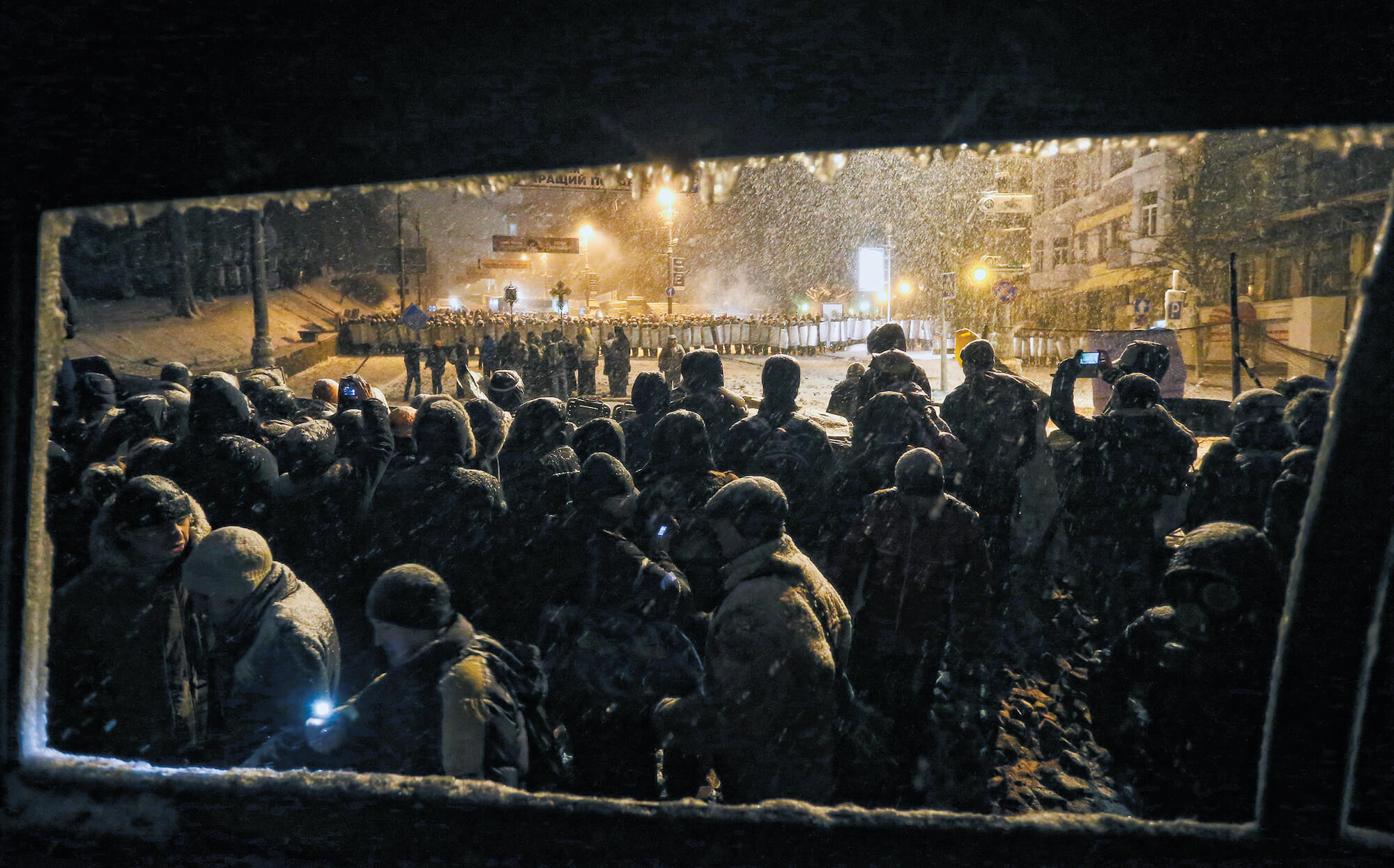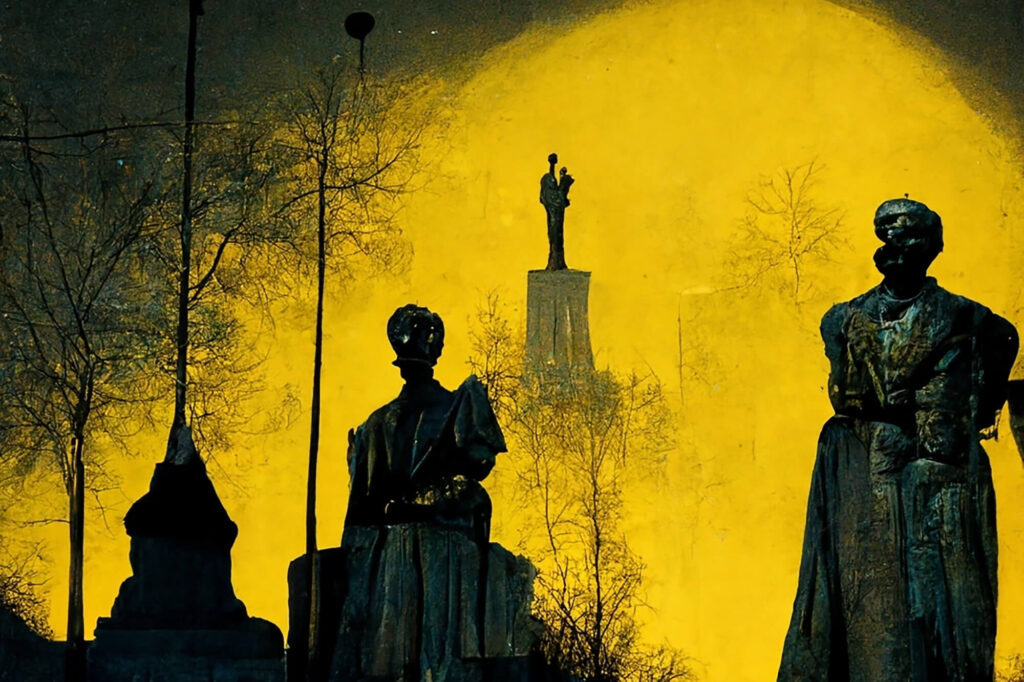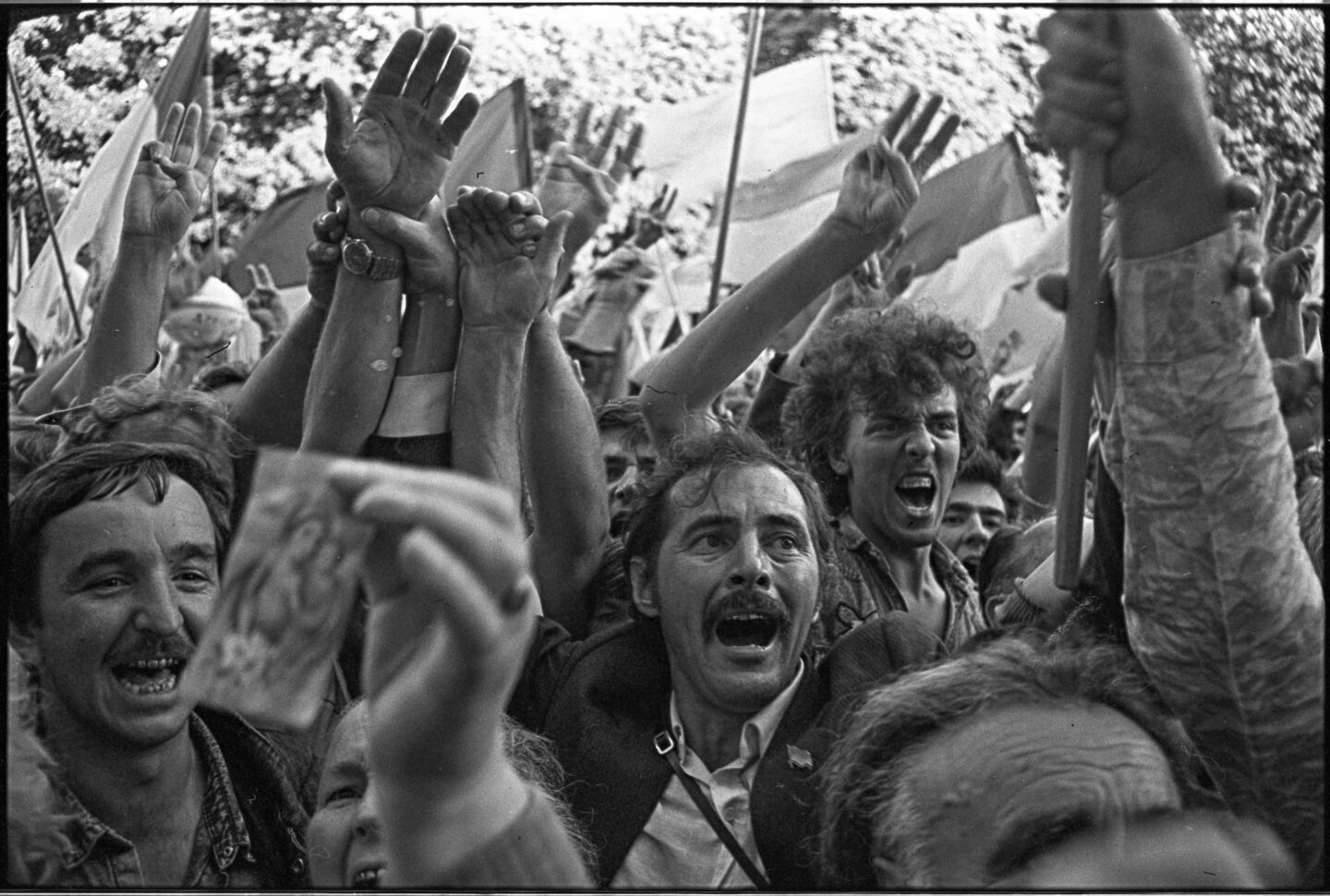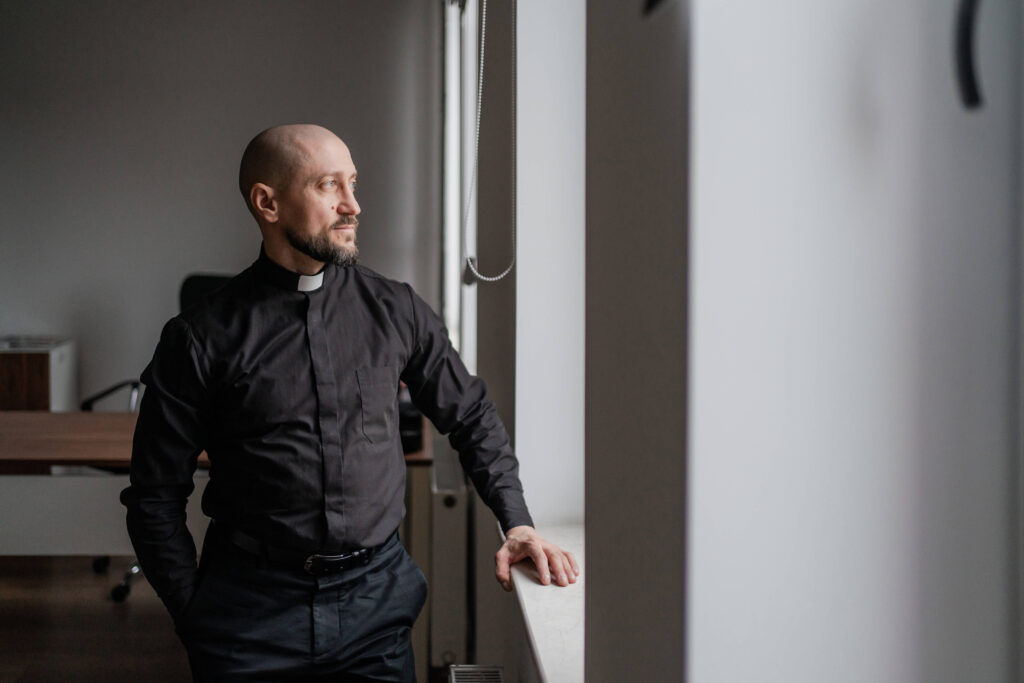Ihor’s arms were forced behind his back, twisted so severely, that his chin almost touched his knees. In this state, he was led down the “walkway of shame”—formed as the Berkut officers parted and watched the detainees with disdain. “Maybe I won’t live to see the morning,” Ihor thought as he was being beaten by the security forces. But at the end of the “walkway,” a special “surprise” was waiting for him: a man in a black uniform bearing no insignia but who was also not wearing a balaclava. Ihor will remember his face for a very long time.
Ihor could no longer stand on his own, so he was held up by two policemen.
“Say that you like Berkut!” barked the man without a balaclava.
An uppercut went flying into Ihor’s face. The only thing he could do was to tuck his chin to his chest. The blow rang in his head, and he felt his nose breaking. At least his teeth were spared. This was the last note of the evening program – they finally stopped beating the detainees. Instead, they ordered them to squat down and hold their hands above their heads.
“Look at them bunnies,” the Berkut officers sneered, watching the beaten prisoners.
Blood dripped steadily from his broken nose onto the bright white snow. “Reminds me of the flag of Japan,” a thought flashed through his mind. Ihor had never been to Japan. He had never seen Fuji. And he had never run a marathon. “It’s a pity if I won’t have a chance,” he thought. The cold wind was chilling to the bone.
***
The year is 2013. Viktor Yanukovych’s administration abandons its European integration goal in favor of rapprochement with Russia. Millions of people disagree, and they take to the streets to join protest rallies in all Ukrainian cities. While the initial demand was for Ukraine to take a course toward Europe, over time, this evolved. After the beating of students on November 30, 2013, protesters began to demand justice not only for those attacked in the center of Kyiv but for all citizens because law enforcement and the judicial system had lost the public trust.
Yanukovych responds by cracking down harder: police chase the protesters, and reports of alleged offenses are churned out in droves. The prosecutor’s office signs off on all of them. The courts turn a blind eye to everything—they place people in pre-trial detention centers on trumped-up charges. All forms of protest are banned. In response, the Maidan protesters demand the president’s resignation and a reboot of the government. As Yanukovych tries to crush the rallies, people are being kidnapped, tortured, and eventually shot in the heart of Kyiv.
But it doesn’t work, and Yanukovych, along with dozens of his cronies, flees to Russia. Ukraine begins to change, and law enforcement and judicial reforms are initiated. The Maidan protesters continue their fight for justice for the next decade.
***
It’s April 2024, and Ihor Paliokha is 41. He has just finished a seven km run in the morning, taken a shower, and is waiting for us at the entrance of his house in the village of Chabany. It is quite warm, so he is wearing a short green T-shirt. Since the beginning of Russia’s full-scale invasion, Ihor has joined a local volunteer militia, stood at checkpoints, caught looters, and, in March 2022, participated in the battles for Irpin. Now, he is waiting to hear back from a military unit about an open position. In the 10 years since the events of Maidan, his hair has turned noticeably gray, but he is still physically fit.
“I strive to run regularly, several times a week. Usually, it is up to 10 km and up to an hour. I never thought that running could be so exhilarating! Shall we take a walk?” he says, shaking my hand firmly.
The Maidan was a turning point for Ihor. After Viktor Yanukovych fled, Ihor started running regularly, found a community of runners, and traveled around Ukraine with them. In this community, he met his future wife, Tetiana Nikonenko. He finished several marathons and too many half marathons to count. We walk slowly around the building, basking our faces in the warm spring sunshine.
“Thanks to Maidan, I took up running. Because I promised myself that when I got out of that park, I would definitely take up running. I’m one of the co-organizers of the Spartan Race, and I help set up all these fixtures for the race. I even managed to participate in a race in Istanbul. Shortly before the COVID-19 pandemic, we bought tickets for several marathons in Europe, but the quarantine began. And then a full-scale war broke out. Although none of this is a reason to stop running,” says Ihor.
He and his wife were planning to move to Chabany from Kriukivshchyna, and they received the keys to their apartment on February 23, 2022. On February 24, they woke up to a new reality. His wife and their young child were evacuated, while Ihor stayed behind. When the Russians were driven away from Kyiv, the family began to plan renovations, and Ihor drafted a design. They started in the fall of 2022 and are almost finished. The large panoramic windows of their apartment face southwest, overlooking the fields and trees where the sun dips behind every evening, with not a single high-rise in sight.
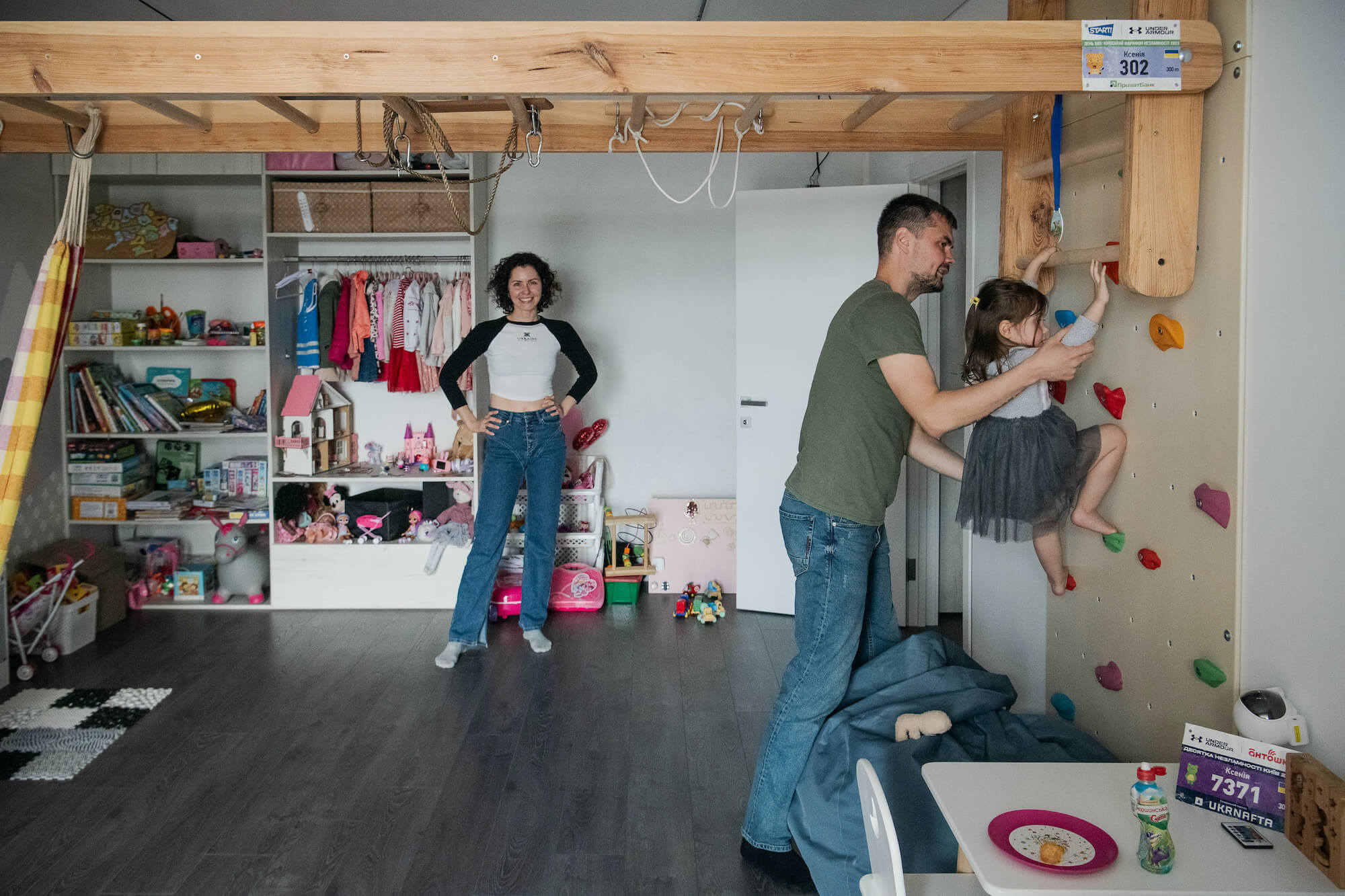
Nowadays, Igor works as a civil engineer. One of the projects he is proud of is UNIT City. Some of the premises he designed and executed have won international awards. He doesn’t talk much about the Maidan or court proceedings in the Maidan cases. Especially in front of his wife. But while she and their child are on a field trip with Plast, I ask Ihor to share his memories. He remembers some things as if they happened yesterday. For example, the face of Serhii Zinchenko from Kyiv’s Berkut unit. He’s the same man who was not wearing a balaclava and broke Ihor’s nose.
***
Before the Euromaidan, 31-year-old Ihor Paliokha was not particularly into keeping up with the news. He did not use social networks or forums. His only source of information was the daily newspaper Segodnya, which he would buy at the subway station on his way to work. Still, he couldn’t shake the feeling that something was wrong with the country. He had lived in Germany for a while, so he had a basis for comparison. He was especially annoyed by the police.
Ihor was an entrepreneur, importing game consoles to Ukraine. His pride was the PlayStation 4—he was one of the first to bring it to the country. However, almost every trip with the goods turned into a quest, as the police demanded more and more documents at every opportunity and immediately offered to solve the issue “for a price.”
“What’s even happening here anyway? Why don’t you ask me for my medical records while you’re at it? A doctor’s report that I have no TB?” Ihor would get irate during such conversations. The scenario always plays out the same way: the police want to see some documents (and money), and Ihor tries to understand why (and avoid paying the bribe).
Everything changed on November 30. That morning, Ihor read that several hundred protesters had been brutally beaten on Maidan Square. They had simply been demanding that President Viktor Yanukovych sign an association agreement with the EU. People on the streets, colleagues at work, friends, and acquaintances were all talking about it. Ihor began to realize that something much more was happening in downtown Kyiv than a simple protest against the government—these events could really affect the future of the country. So he started going to Maidan Square.
Not regularly, not staying overnight. He had to make money and pay the rent. But at the same time, he wanted change. The Maidan also reminded him of a state within a state. And this atmosphere gave him goosebumps: hundreds, thousands of strangers united by one goal.
On January 16, 2014, the Verkhovna Rada voted in favor of dictatorial laws that banned any manifestation of discontent in society: rallies, demonstrations, and car rallies. Everything was banned. Even masks and protective helmets. For violating these “rules,” Maidan participants could be imprisoned for 15 years. All of this combined amounted to attempts to overthrow the constitutional order. Ihor realized: “It was either us or them.”
***
On the evening of January 22, Igor came to Maidan as usual to support the protest. He found his friends—Yulia Volkova, Denys and Volodymyr Sergienko. The latter two he has known from business since 2007. They were members of Automaidan. The men went to throw tires into the fire of the barricades on Hrushevskoho Street. Suddenly, they received a message: someone was trying to abduct the injured Maidan participants from the emergency hospital on the left bank of Kyiv. Without hesitation, all four jumped into a car and quickly navigated the city streets in the evening light to rescue their fellow protesters.
Near the hospital, a crowd had already managed to block a car. Surrounded by people, a man in civilian attire stood near the car. He was very annoyed by the crowd.
“Who do you think you are? And what do you want from me? Really?” Even his questions were delivered as an order.
“Get lost! No one will transfer anyone from here! And we will see to it!” The Maidan protesters yelled back, equally defiant.
The civilian with such a commanding voice, probably a police officer, drove away. Ihor and his friends stood guard outside the hospital for a while, and eventually, they decided to go home to sleep. As they were passing Parkova Road, they received a message on their Zello digital radio: a group of activists was being chased by the police near Mariinsky Park and needed backup. Ihor and his friends looked at each other and decided to go there.
A few minutes later, their car reached Kriposny Lane. A smashed yellow VW Transporter stood not far from the Officers’ House, with Berkut officers, all wearing helmets and balaclavas, huddled around it. Yulia, who was driving, tried to turn around quickly. One of the special forces officers smashed the windshield with a baton and the activists’ car was blocked by a bus with police officers. The car was pummeled from all sides.
Yulia was dragged through the window of the side door. Denis, who was sitting next to her, was dragged out through the open door. They tried to pull Rostyslav, another Maidan activist who was traveling with Igor, out from under the car: the man fell out of the car and, trying to save himself, crawled under the car and grabbed the wheel. Without missing a beat, the Berkut officers twisted his arm and pulled him out. The last two passengers, Volodymyr and Ihor, remained inside. Volodymyr was beaten with batons right inside the car through the open door, Igor was hit through the broken window, and tear gas was used against them. Eventually, the activists managed to unlock the door and jumped out into the street. Under a hail of baton attacks, Ihor saw a crowd of Maidan activists running toward them. The security forces saw this as well: they grabbed as many as they could and dragged them to their bus.
There were people already inside. Some of them had nothing to do with the protests. For example, a taxi driver and a woman with her son, his passengers. They were going to their grandmother, who lived in the center of Kyiv and who suddenly fell ill that evening. A guy who was returning home from a night out but also got picked up by the police. Ihor was thrown like a bag of garbage on a rag that reeked of gasoline. Someone from the security forces sat on top of him. The drive wasn’t long—the detainees were brought to Mariinsky Park. And in a strange way, the people were “sorted”: some ended up in the hands of ordinary policemen, while others were handed over to the “elite,” i.e., Berkut. And in a month, Berkut’s Kyiv unit would shoot 48 people in the downtown of Kyiv.
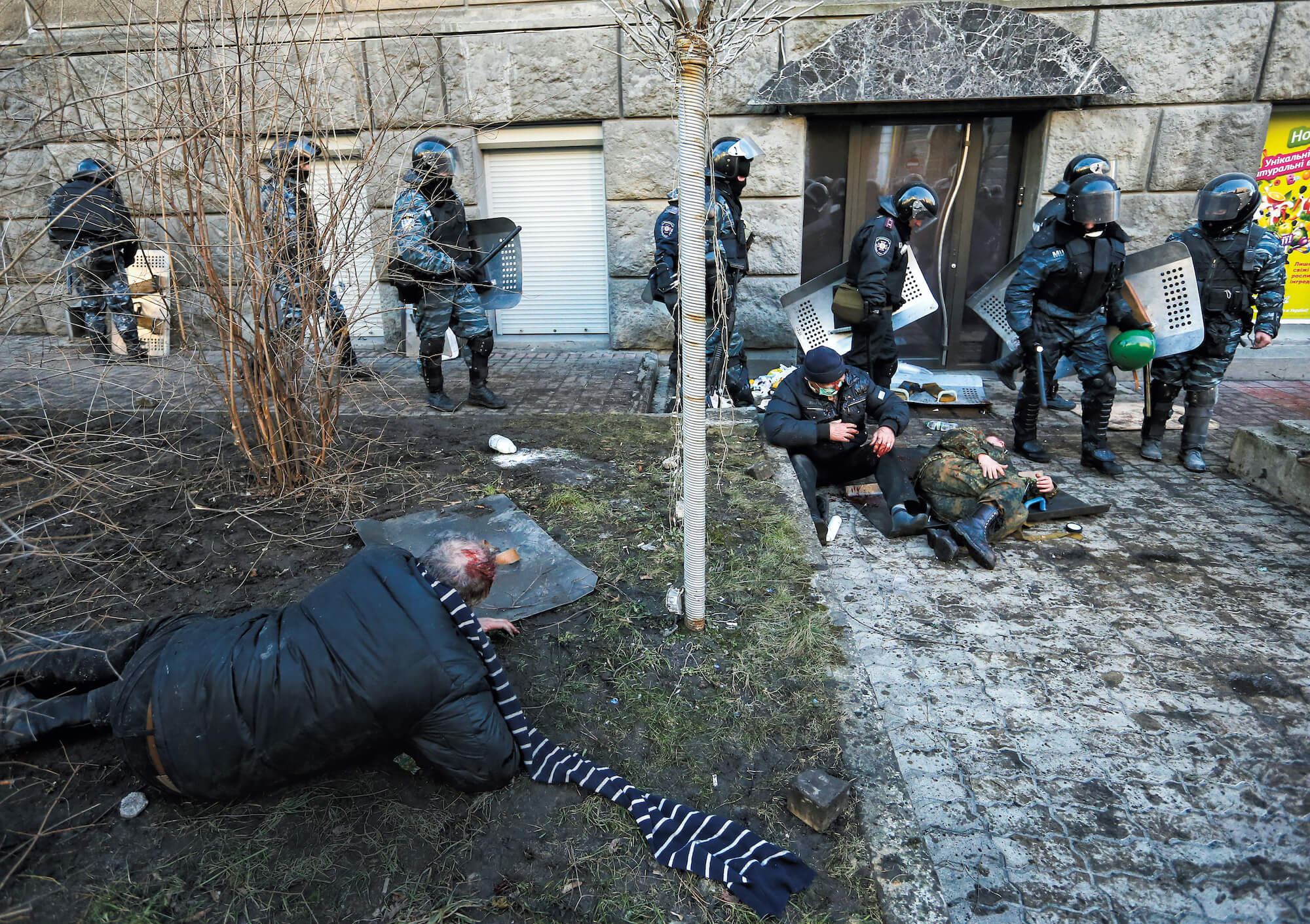
***
When Ihor saw a video of a detained Berkut officer suspected of mass shootings on February 20, 2014, on Instytutska Street, he immediately called his friends from the Maidan and lawyers. He was probably the only policeman who hadn’t hidden his face while the others were playing “bunnies” with the detainees in Mariinsky Park.
“My clothes were riding up around my head, and I tried to straighten them. And I got a kick in the stomach—a message for ‘don’t fidget,'” Ihor recalls. “I asked to cover my kidneys because it was cold. And I remember one of the commanders said, “Let them be.” In the morning, we were put on another bus, driven around the city for a long time, and finally brought to the Obolon district police station. There, they drew up some protocols regarding us and finally let us use the restroom.
Investigators accused Ihor of preparing and throwing Molotov cocktails at Hrushevsky Street. He denied it. He said he smelled like gasoline because he had been lying on rags soaked in fuel for a long time. He offered to have his clothing be forensically tested. Ihor’s clothes were taken away, and he was given a different set. His trial began around midnight on the night of January 24, 2014. That day, he recalls, many Maidan activists came to the court to support him. Ihor himself looked exhausted—his face was swollen and bruised. The judge who imposed the pre-trial detention measure disregarded all possible explanations and warnings. Ihor was ordered to be imprisoned in a pre-trial detention center for two months. However, because of his head injuries, instead of going to Lukyanivska prison, he was taken to an emergency room in the neurosurgery unit.
“That same day, I found out who Oleh Tatarov was,” Ihor says of the then deputy head of the Main Investigation Department of the Ministry of Internal Affairs, “I saw an interview in which he said that activists were trying to upend the constitutional order in Ukraine.”
Some of those accused of “upending the constitutional order” ended up in the same hospital room.
“There were five of us there,” Ihor recounts, “So that’s me, my friend Denys, he was in the car with me, two other activists, and an old man. Mykola Pasichnyk. As I found out later, he was detained near Lobanovsky Stadium. He, too, was accused of making Molotov cocktails.”
At that time, Ihor could not have known how tragic Mykola Pasichnyk’s story would turn out. Back in 2014, the man was severely beaten during his detention, and then they tried to try him on trumped-up charges. After the Maidan, he would go to court hearings, and in March 2020, he would die before he could receive a verdict against his offenders because the trial was dragged out by the defendants.
While Ihor and the others were in the hospital for a little under a month, they tried talking to the guards, who rotated in shifts. The first shift was probably cadets or guys who had recently become police officers. They would occasionally eat cookies and apples meant for the “detainees” and listen to music on their phones. Ihor characterizes the second group of guards as “bullish”— they tried to accuse Ihor and his fellows at the hospital of killing policemen. One of the myths spread at the time was related to the killing of policemen during the protests, in particular from November 2013 until the shootings on Instytutska Street. In fact, 13 law enforcement officers were killed during the Maidan, all from gunshot wounds, all after February 18, 2014. There was no dialogue to be had: the police considered the Maidan protesters as villains, and vice versa—the protesters considered all police officers as criminals.
“Once, we simply told them that we would have to coexist, whether they wanted to or not. And that we weren’t going to jump on them wielding forks. After that, they seemed to calm down a bit. However, suddenly, rumors began to circulate that the Maidan protesters wanted to snatch us. The guards were worried, and we were confused. We said that if these policemen wanted to, they could handcuff us to our beds. But we were not planning to escape. We had to get treatment,” explains Ihor.
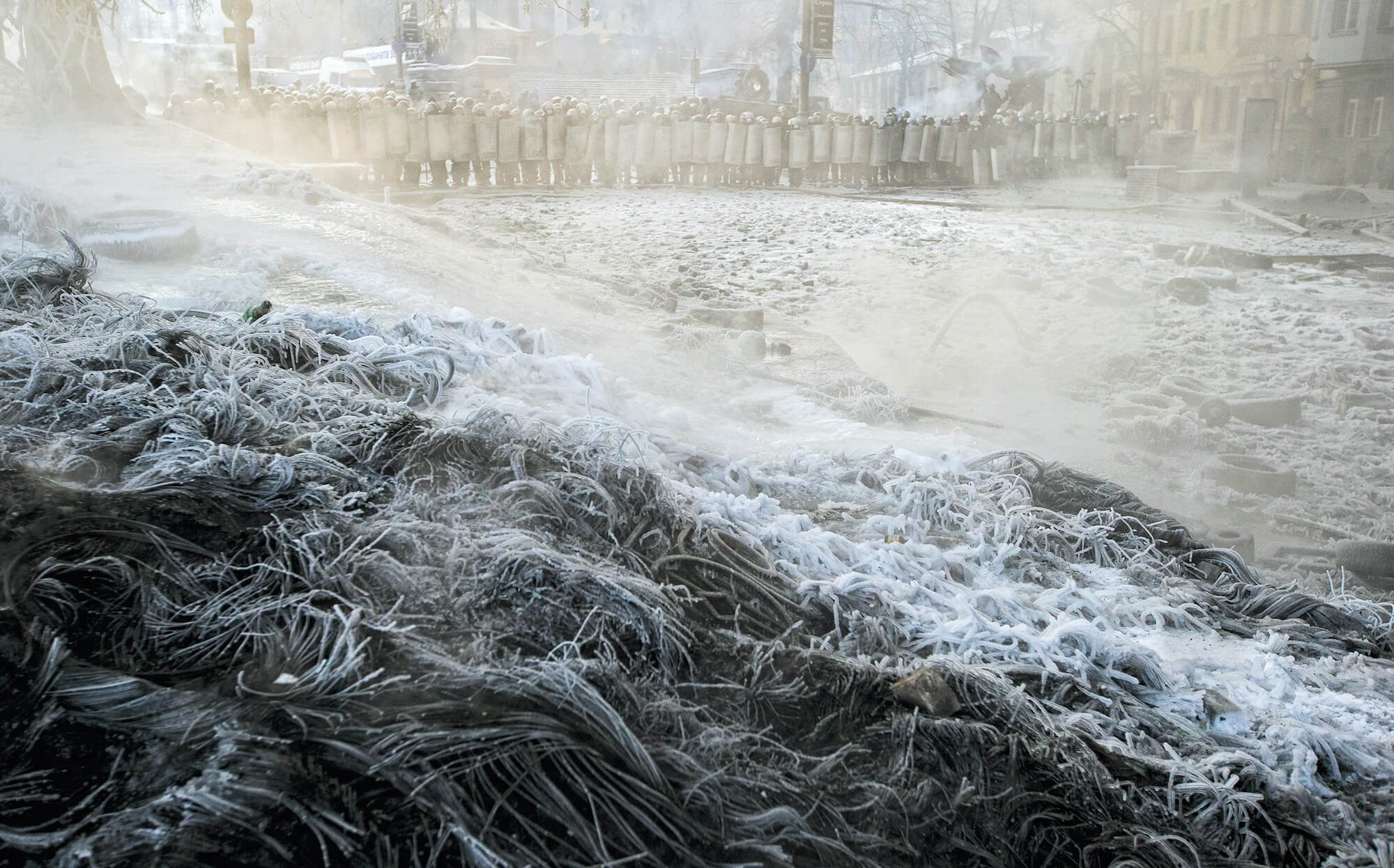
The court released him on February 11, on his birthday. His detention was replaced by home incarceration. But Igor had to spend several extra days in the hospital. There, he met with the European Commissioner for Enlargement and European Neighbourhood Policy Stefan Fule. He asked how Igor was treated in the hospital and whether he had any complaints. At the same time, prosecutors began visiting the imprisoned Maidan activist, demanding that he sign a paper stating that he had no complaints against the police. Ihor, of course, had complaints, and quite a lot of them, actually. The prosecutors got annoyed and promised that next time, they would come bringing more serious charges. As a result, it came to the point where they promised to put him in prison for 15 years for attempting to overthrow the constitutional order.
***
“I haven’t been to Japan yet, but I still want to see Fuji. Unfortunately, the Russians ruined these plans. But my wife and I travel around Ukraine and go running. We have a daughter, three years old, so she also runs her 300-meter race. It’s tough being born into a family of athletes,” Igor laughs.
His wife Tetiana and their child are just returning from an educational field trip. The kid sees us and, at first, hides in her room. Then, she cautiously enters the kitchen, snags a few eclairs from the table, and runs back to her room. Ihor, Tetyana, and I follow. The children’s room is huge, divided by a hanging ladder with a swing. On the sides of it are climbing walls. There is a large bookcase in the corner. In the winter garden, as the owner calls it—near the large panoramic windows—there are dozens of plants of various shapes and sizes. Ihor has had a passion for houseplants since he was a child.
“When I was finishing kindergarten, we had dates as a treat. And this was around 1990. Imagine, I had never tasted anything like that! I decided to grow a tree from a date pit. I succeeded. Since then, I have been fascinated by plants. Recently, I was planting orchids. Unfortunately, I broke one of them. It was an accident. But it forgave me and sprouted two new shoots at the site of the break,” says Ihor, gently caressing the orchid leaves.
His wife sits on the opposite couch, under a huge world map painted directly on the wall. Each country here has its fabled animal. Of course, the bear, situated in the center of Eurasia, grabs the attention.
“I hope that when the kiddo grows up, we will redo this map and draw Russia like on Budanov’s map: divided into many separate and independent states. For example, Yakutia or Tatarstan. I really want to believe that,” he says.
***
Ihor also really wants to believe in the fairness of the Ukrainian justice system. It hasn’t been easy.
“I went to interrogations, to courts,” Ihor recalls, “especially in 2015. But by sometime in 2017, I realized that nothing would come of it and that no one would be punished, because cases were merged and separated. Each Berkut member has two lawyers. And it’s impossible to gather them all together in one place: one is sick, the other has a wedding, the other a birthday. In the end, I signed a waiver that the hearings could take place in my absence. That’s how dragged out they were. Of course, I testified in every court session. But the hearings were seldom – once every two or three months. And recently, the statute of limitations has expired,” Ihor notes sadly.
He is annoyed that people who committed crimes will go unpunished. Perhaps, he suggests, the biggest issues here are with the courts and judicial reform, since they are responsible for arranging court hearings. Nevertheless, this activist is confident that the Maidan achieved its goals.
“Of course, we didn’t accomplish everything we wanted to, but we definitely did everything we could. There is less abuse of power by law enforcement agencies. At least you won’t be approached on the street by a gun-toting patrol officer who will start checking all your documents. People’s mindset has changed. Because people saw what they had to do. I think the Maidan has changed many of us for the better,” says Ihor, carefully considering each word.
That’s where we say goodbye, as Tetyana has an important court hearing tomorrow. She is a lawyer and a defense attorney. She works with the Lawyers’ Advisory Group, defending the victims of the Maidan. Due to a conflict of interest, she cannot represent her husband in court, but she tries to do her best for others. On the way to Kyiv, I think about the inscription on the wall of the nursery: “You have to run as fast as you can just to stay in place. And if you wish to go anywhere, you must run twice as fast as that!”
It would seem that this line from Lewis Carroll’s Alice in Wonderland is about almost everything but running.
***
Serhiy Zinchenko, the officer who broke Ihor’s nose, avoided accountability: On December 29, 2019, he was transferred to the occupied territories of the Donetsk region during a prisoner exchange. He never returned, unlike his two colleagues.
Judge Yulia Orobets (Bevzenko), who arrested Ihor, was fired in 2017. She tried to appeal this decision to the Supreme Court, but in 2018 her appeal was rejected. She could not get reinstated.
Former Berkut commander Mykhailo Dobrovolsky, who organized the ambush on the Maidan activists in Kreposny Lane, which resulted in Ihor’s arrest, will never receive a verdict: on February 23, 2024, the Podilsky court closed the case on the grounds of statute of limitations.
***
While the revolution was raging in the heart of Kyiv, Tatiana did not go to Maidan Square but followed the news closely. She had just started her career as a lawyer, working for a private company where most of her cases were related to commercial and administrative law. She encountered the protests in the winter of 2014—she was standing outside the Administrative Court of Appeal, waiting for a hearing, when she suddenly saw a group of guys with batons, the so-called titushky from the Anti-Maidan, running past her.
Due to the uncertain political situation, the hearing was canceled, and the court was closed until further notice. The company where Tetiana worked forced her to take a few days off, and her boss instructed her to stay home. The trip to Chabany became more difficult – most buses and mini buses were packed with people. It seemed to Tetiana that the whole of Kyiv had decided to flee far away from the street clashes.
For the next few days at home, she stayed on her computer and read the news. The reports from the center of Kyiv shocked her: it was hard for the young lawyer to believe that the police could exhibit such aggressive behavior in a country governed by the rule of law.
Her parents called. They asked her not to go to Kyiv. Later, Tetiana found out that her father did go to the protests from time to time, though he never told anyone. Perhaps he did not want his daughter to go with him. Tetiana, however, did not want to go to the Maidan. Perhaps, she admits now, she was just afraid at the time.
Now, she is not afraid. When she returned to legal practice after her maternity leave, she took up the defense of Maidan protesters in court.
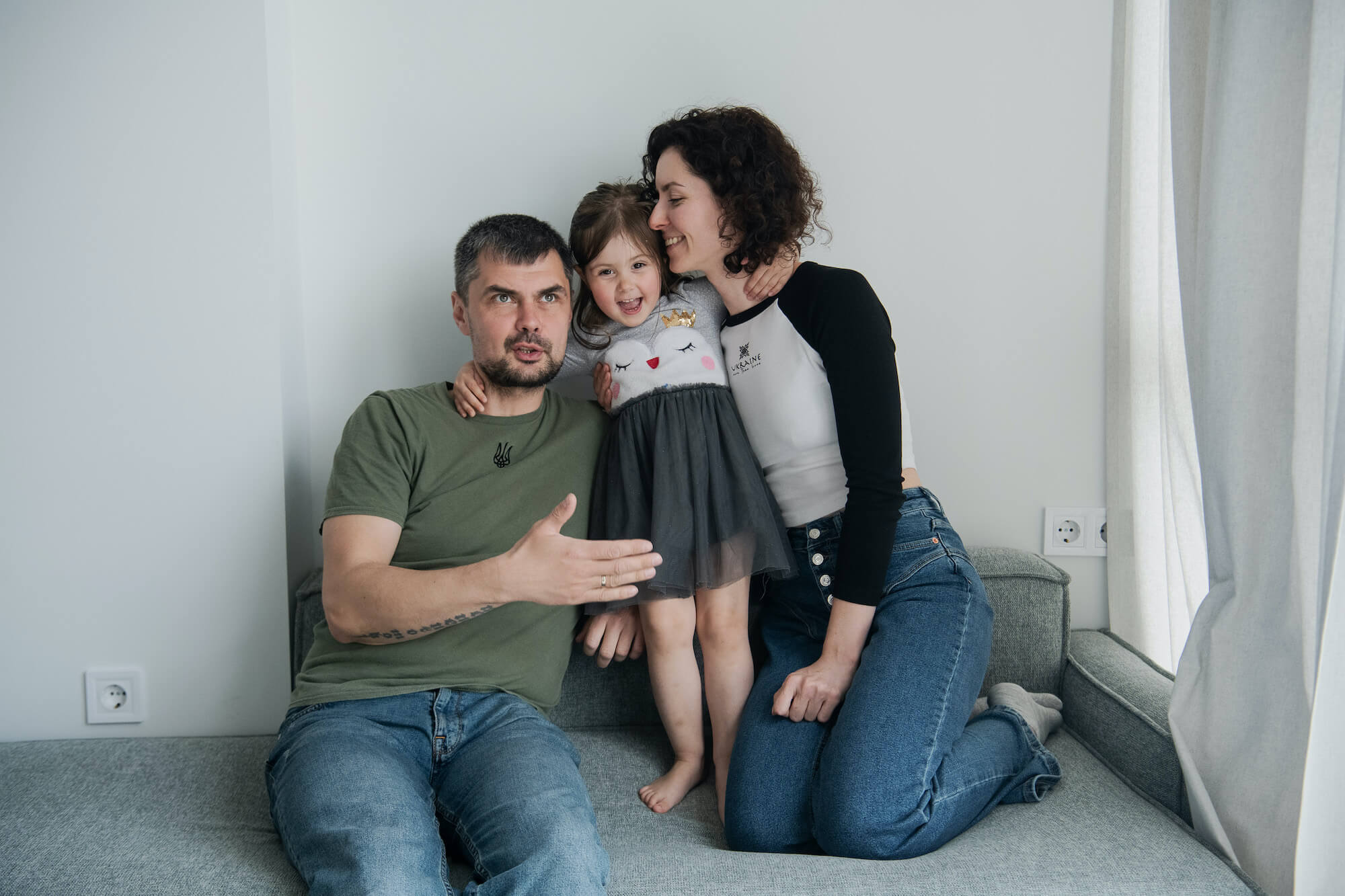
***
These days, Tanya has two cases, both related to the supply of stun grenades from Russia to Ukraine. During the revolution, when Yanukovych’s administration realized that they were running out of special munitions to disperse protesters, they turned to friendly Moscow for help. And the Kremlin responded: a plane landed in Kyiv twice, bringing a total of about 13,000 different special munitions. These grenades were more powerful, had not been tested by the Ministry of Health of Ukraine, and should not have been used. According to protocol, the police could only put them into circulation after the ministry had completed its assessment. But Yanukovych did not care about such formalities. So, on February 18, 2014, these grenades were launched en masse at protesters right in the government quarter.
The number of people injured by Russian “humanitarian aid” reached hundreds. After the ex-president’s flight, at least four people were suspected of delivering the munitions: former Interior Minister Vitaliy Zakharchenko, his former deputy Viktor Ratushniak, former director of the Interior Ministry’s Material Support Department Pavlo Zinov, and another former deputy, Serhiy Lekar. The former three fled to Russia. The latter one is still in Ukraine. And he is one of the few defendants accused of crimes against Maidan who attends the hearings.
Evening falls on Chabany. Tetiana settles into her office chair. Tomorrow is an important court date; they will cross-examine a victim, only the third of 120 people injured by Russian grenades. Tetiana turns on her computer and picks up a notebook and a pen. Under the spotlights hanging from the ceiling, she reads over everything about tomorrow’s victim. She writes something in a notebook in thin and neat lettering. She also has to call the victim, talk to him, reassure him, and explain that he shouldn’t try to recall forgotten details. It won’t help the court. Tetiana would love to go for an evening run, but she is sorely pressed for time.
***
The next day, we meet at the Holosiivskyi District Court, a three-story cubical building hidden in the shadow of a residential building. From afar, it looks more like a big store than a court. There are no benches around, so we, like most visitors, sit on the curb of a concrete flower bed. We have about half an hour before the hearing starts. Tetiana says that even if the air raid alert sounds, the trial will go on because there are too many cases and not enough time.
“I had never worked with criminal proceedings before. And when I was on maternity leave in 2021, I was trying to find myself. I wanted to do something important, and not deal with the taxation of private companies. Thanks to Ihor, I met a group of lawyers from the Attorneys’ Advisory Group who handle cases of Maidan victims pro bono. Last year, I started helping them a little bit with documents, and in June 2023, I became part of the team. And I took up cases of Russian special munitions,” says Tetiana.
She recalls that when she first came to the prosecutor’s office to pick up the case files, they did not fit on her flash drive. She doesn’t remember the exact amount of data, but she recalls that there are about 130 volumes in the case, and one volume is usually about 300 pages. On top of that, Maidan cases weigh heavily on the soul.
“When a victim stands in front of you, recounting emotionally, in detail, how they were shot in the head, how the police tried to kill them… It’s hard to grasp that people could be subjected to such things, that people experienced such things. Once, I got dizzy from hearing such details. But you still have to listen carefully, analyze it, and re-read it later. So that the perpetrators are punished,” says Tetiana.
We pass through the metal detectors, head down a dark corridor to the stairs, and from there to the second floor. The space is tight: benches line the walls where visitors waiting for hearing are seated. From time to time, a guard clears a path through the corridor when they are leading the defendants. A man in a blue suit approaches us. He shakes hands with everyone. We can see that his right hand has no phalanges of the thumb and index finger. He is the victim who will be interrogated today. He was injured by Russian special munitions.
“Now there is a risk that the Maidan cases will be dismissed without any verdicts. Because the statute of limitations is running out. Yes, this is what is called ‘legal certainty,’ and it’s according to the law. But it is wrong that cases drag on for years with no resolution. I don’t want to believe that judges are deliberately dragging them out,” Tetiana says with a touch of sadness.
Our hearing starts half an hour late. The courtroom is small, the windows are barred, and there is almost no open space. There is a glass box for the defendants in the corner, and a table, presumably for the lawyers, next to it. There are two rows of benches close to it. In the center is a lectern with a microphone for questioning parties to the trial. Less than a meter away is the judge’s desk. As soon as all the parties take their seats, I realize there is no room for my colleague and me. Tetiana laughs. She says this isn’t even the smallest room in which court hearings take place.
“The biggest problem is time. For example, in the case of Lekar, which we are about to hear, there are 120 victims. Not all of them will come: some are serving in the army, some have gone abroad, some are not coming because they see no prospects and say there will be no justice. I would really like judges to understand the volume of these cases and schedule hearings more often than once every two or three months. And not for one hour, but at least for three or four. Otherwise, it may happen that there will be no punishment for the guilty. And unpunished evil always returns. I understand this very well,” the lawyer says..
Today’s hearing involving the questioning of a witness will last an hour and a half. Afterward, Tetiana will return to the office and write a report late into the night. She will not head home, even when the clock strikes eight.
“For me, the Maidan cases are probably redemption for not being more aware ten years ago. I am glad to have this atonement. I do everything I can to help so that people can see that not everyone is indifferent and that cases are not being dumped. That there are courts where hearings are held. I would like to believe that this run will move us forward. After all, this is what we are working for. It’s not enough just to run; we have to run as hard as we can,” Tetiana says.
The sun has nearly set, and dusk falls over Kyiv. The lawyer resolves to finish her work at home.
Translation — Marichka Androshchuk
§§§
[The translation of this publication was compiled with the support of the European Union and the International Renaissance Foundation within the framework “European Renaissance of Ukraine” project. Its content is the exclusive responsibility of the authors and does not necessarily reflect the views of the European Union and the International Renaissance Foundation]

